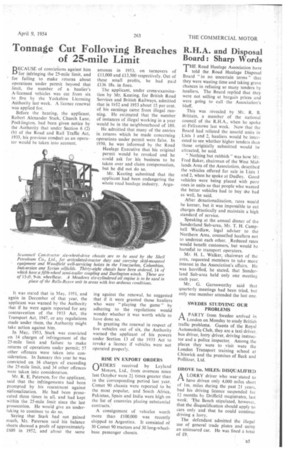Tonnage
Page 39

If you've noticed an error in this article please click here to report it so we can fix it.
Cut Following Breaches R.H.A. and Disposal of 25-mile Limit Board : Sharp Words BECAUSE of convictions against him 1-1 for infringing the 25-mile limit, and for failing to make returns about operations under permit beyond that limit, the number of a haulier's A-licensed vehicles was cut from six to five by the Yorkshire Licensing Authority last week. A licence renewal was applied for.
Before the hearing, the applicant, Robert Alexander Stark,. Church Lane, Pocklington, had been given notice by the Authority that under Section 6 (2) (b) of the Road and Rail Traffic Act, 1933, his previous conduct as an opera• tor would be taken into account.
It was stated that in May. 1951, and again in December of that year, the applicant was warned by the Authority that if he were again reported for any contravention of the 1933 Act, the Transport Act. 1947, or any regulations made under them, the Authority might take action against him.
In May, 1953, Stark was convicted on 14 charges of infringement of the 25-mile limit and failure to make returns of operations under permit; 57 other offences were taken into consideration. In January this year he was convicted on 16 charges of exceeding the 25-mile limit, and 34 other offences were taken into consideration.
Mr. R. E. Paterson, for the applicant, said that the infringements had been prompted by his resentment against nationalization. He had been prosecuted three times in all, and had kept within the 25-mile limit since the last prosecution. He would give an undertaking to continue to do so.
Saying that Stark had not gained much, Mr. Paterson said his balance sheets showed a profit of approximately f601) in 1952, and about the same
amount in 1953, on turnovers of £11,000 and £13,500 respectively. Out of these small profits, he had paid £136 18s. in fines.
The applicant, under cross-examination by Mr. Keating, for British Road Services and British Railways, admitted that in 1952 and 1953 about 15 per cent. of his earnings came from illegal running. He estimated that the number of instances of illegal working in a year would be in the neighbourhood of 180.
He admitted that many of the entries in returns which he made concerning operations under permit were false. In 1950, he was informed by the Road Haulage Executive that his original permit would be revoked and he could ask for his business to be taken over and claim compensation, but he did not do so.
Mr. Keating submitted that the applicant had been endangering the whole road haulage industry. Argu ing against the renewal, he suggested that if it were granted those hauliers who were "playing the game" by adhering to the regulations would wonder whether it was worth while to have done so.
In granting the renewal in respect of live vehicles out of six, the Authority warned the applicant of his powers under Section 13 of the 1933 Act to revoke a licence if vehicles were not operated properly.
RISE IN EXPORT ORDERS
ORDERS received by Leyland Motors, Ltd., from overseas since last October were 2; times greater than in the corresponding period last year. Comet 90 chassis were reported to be the most popular, and South Africa, Pakistan, Spain and India were high on the list of countries placing substantial contracts.
A consignment of vehicles worth more than £100,000 was recently shipped to Argentina. It consisted of 30 Comet 90 tractors and 30 long-wheelbase passenger chassis.




































































































